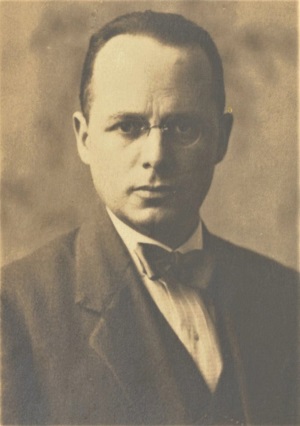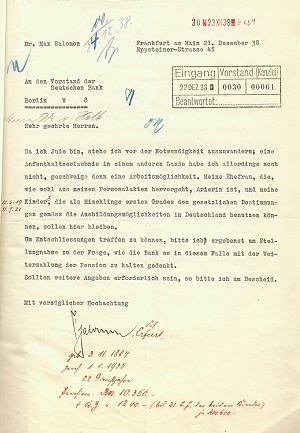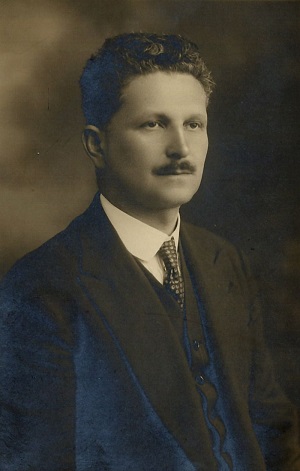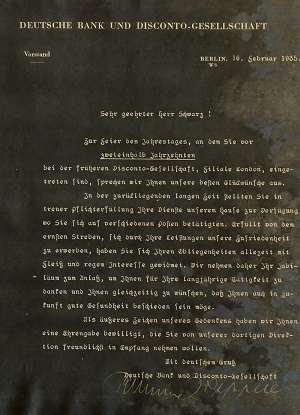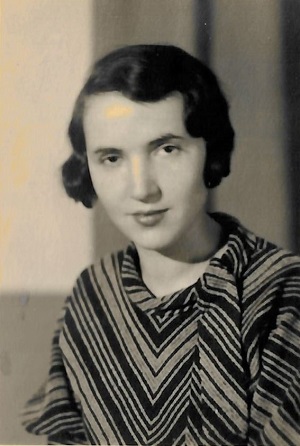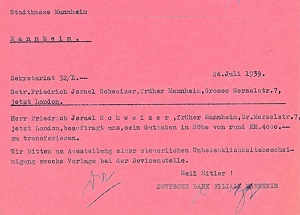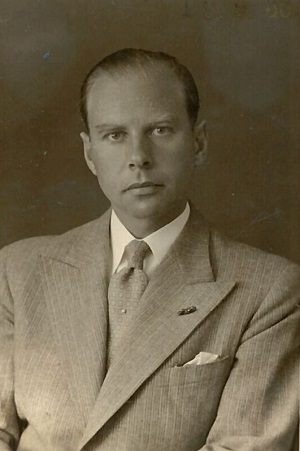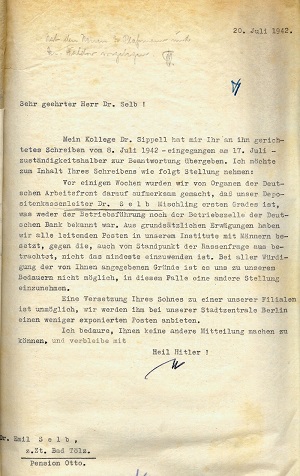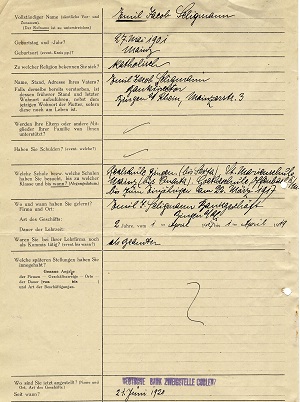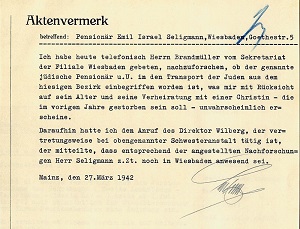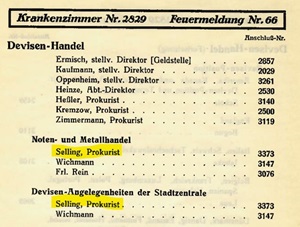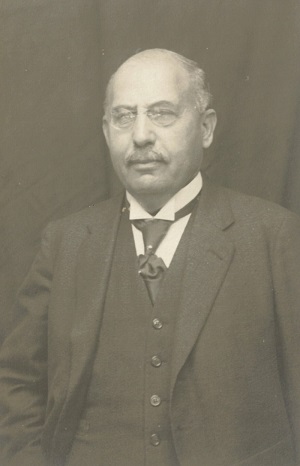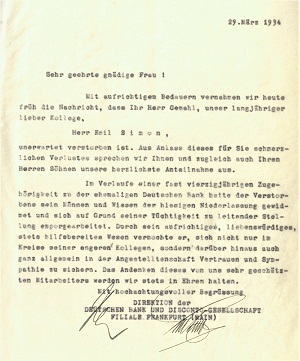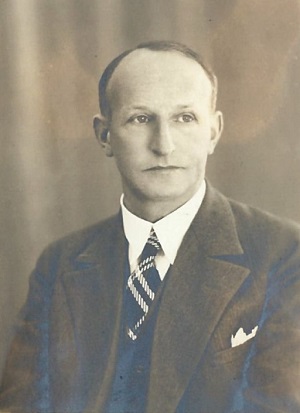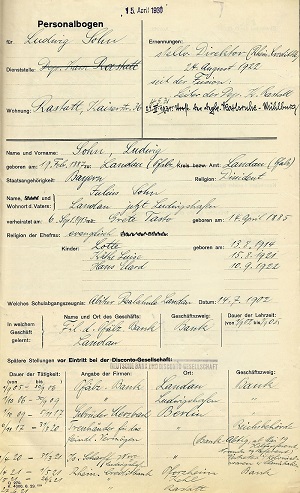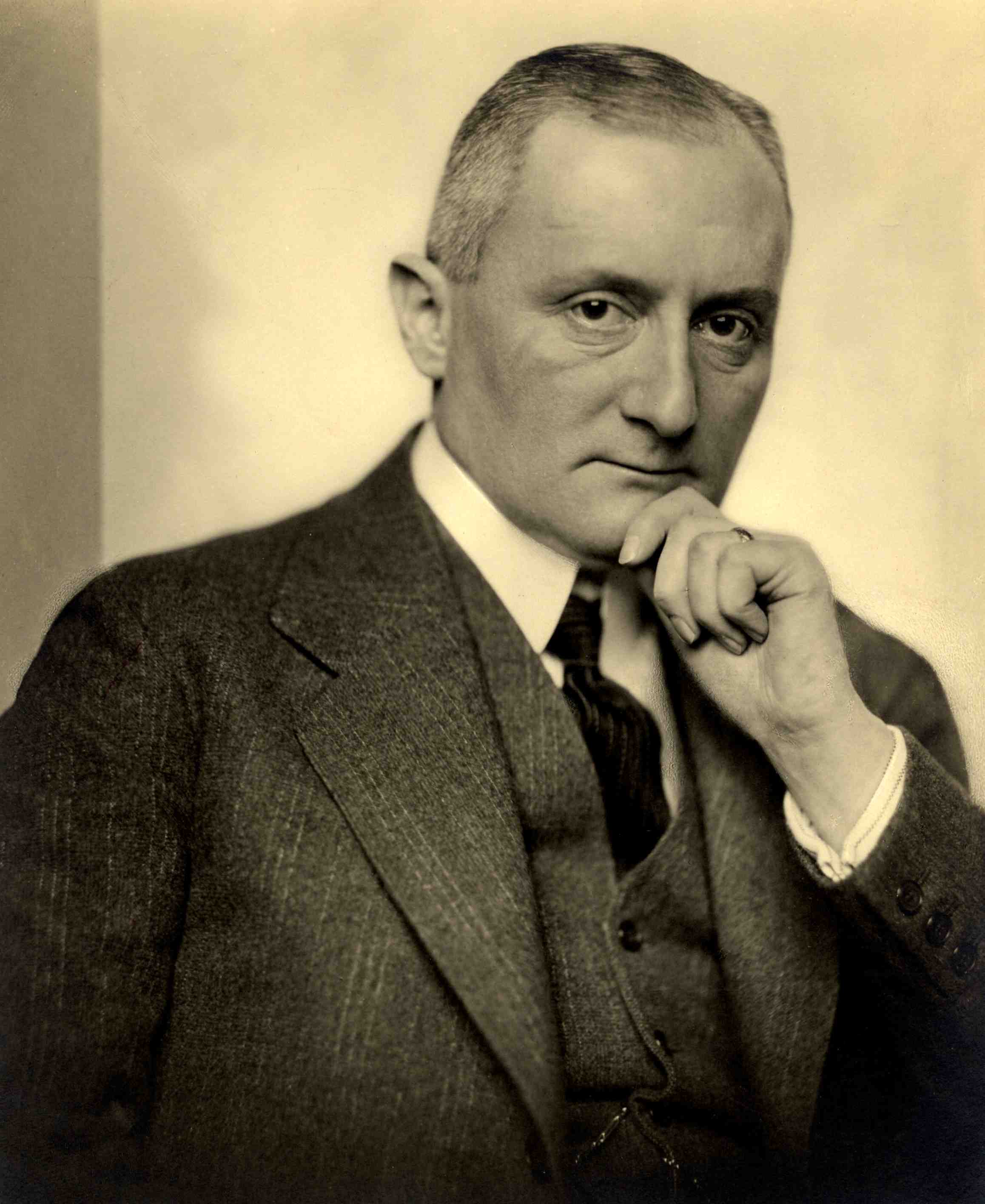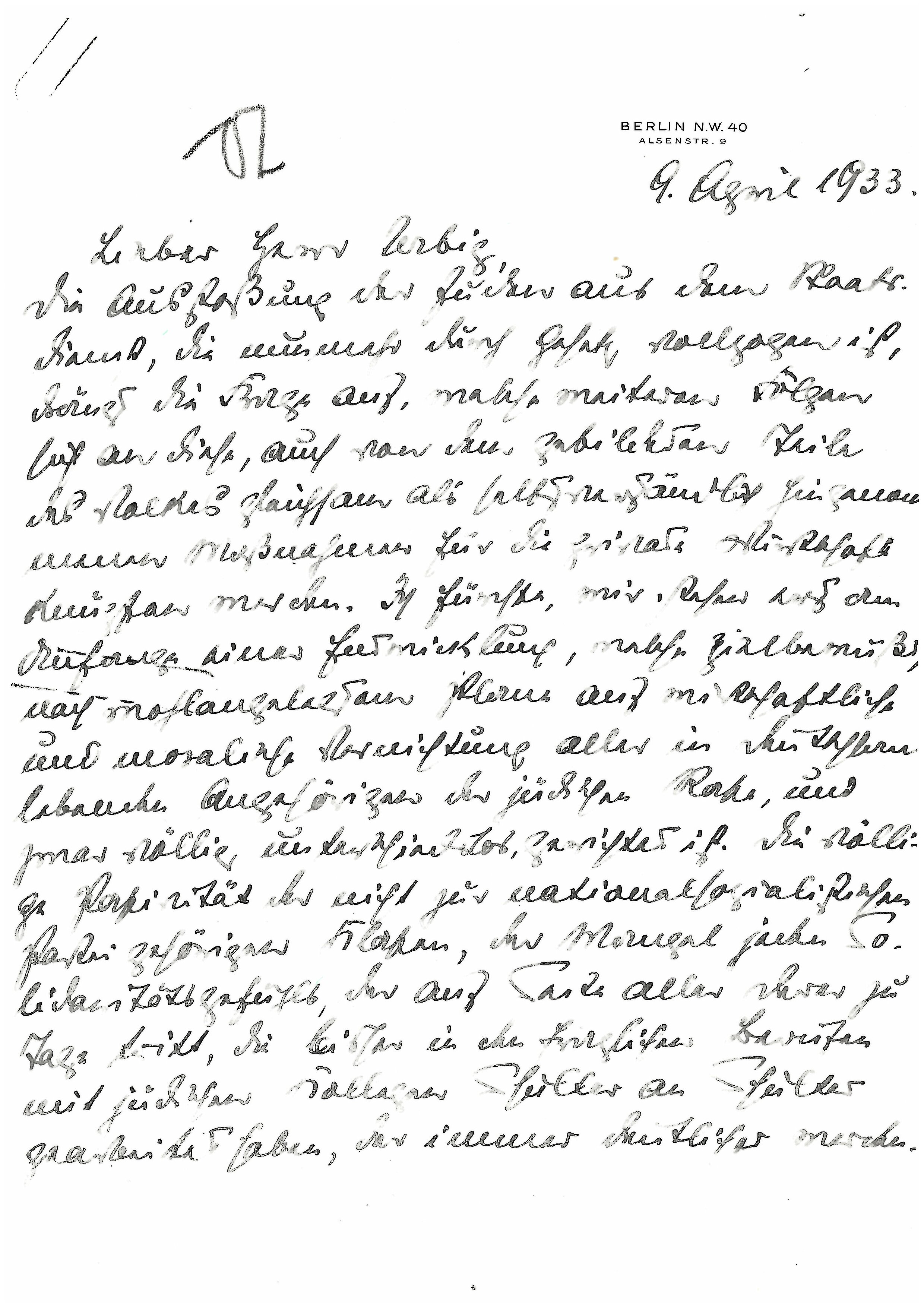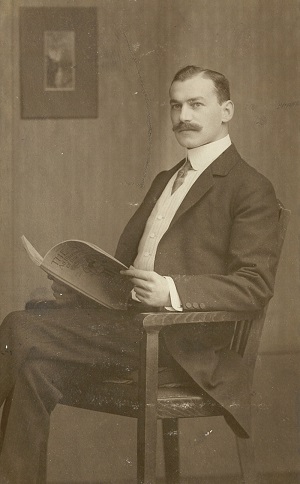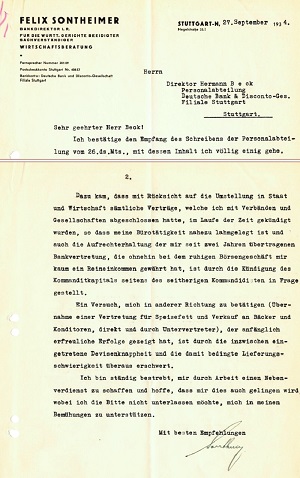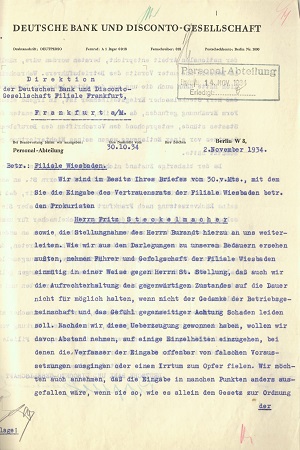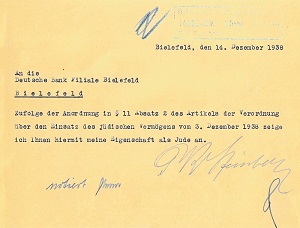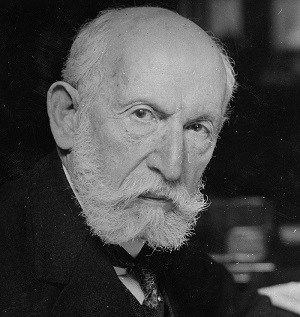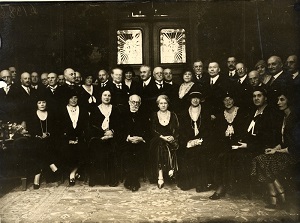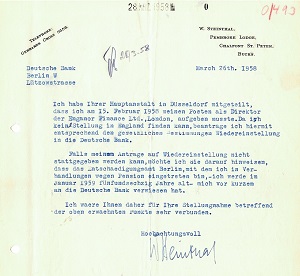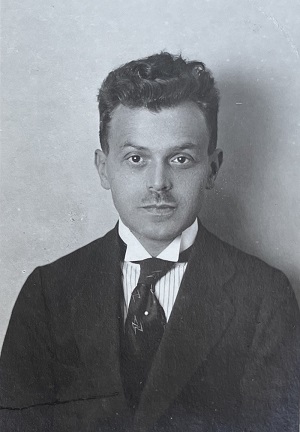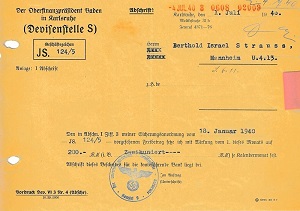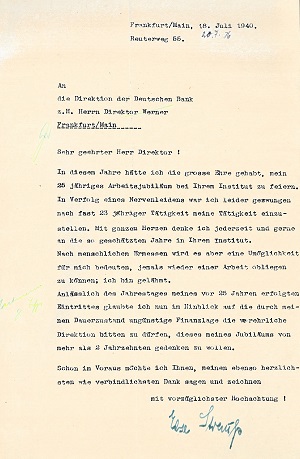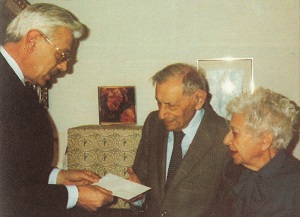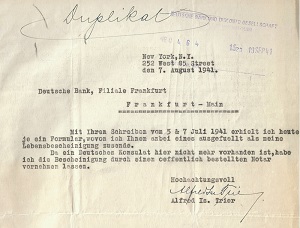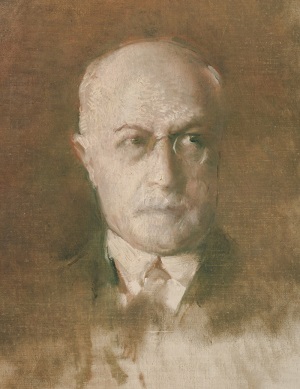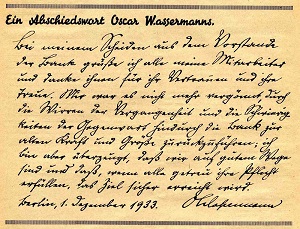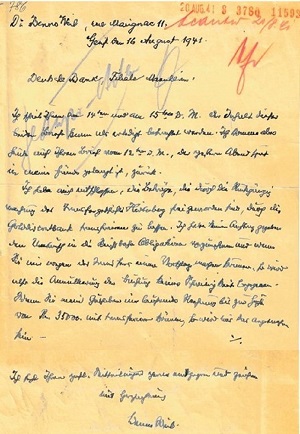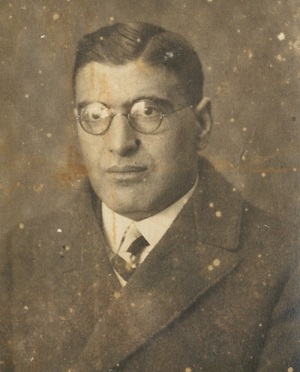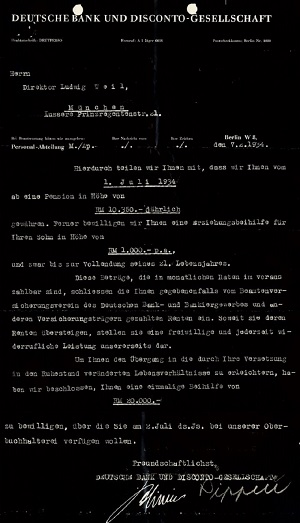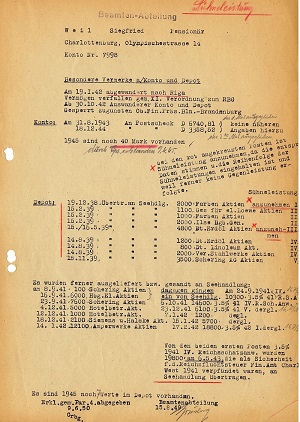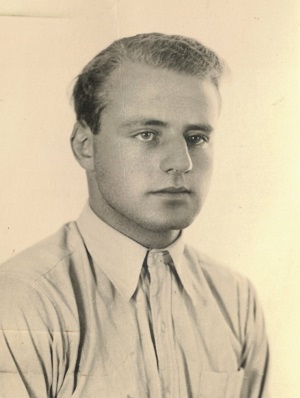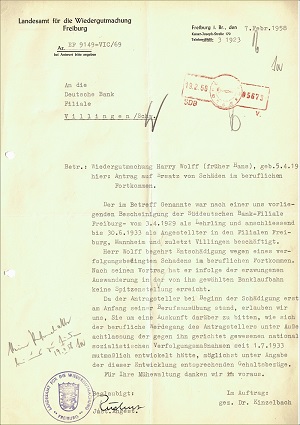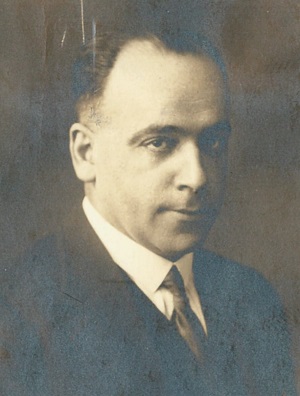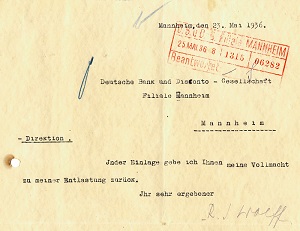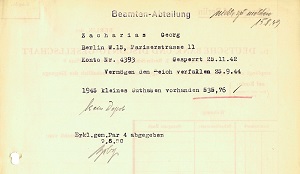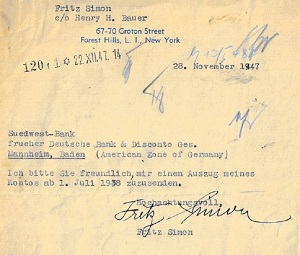Show content of Salomon, Max
| first name(s), surname: | Max Salomon / Max S. Shellens |
| day of birth: | 03.11.1884 |
| birthplace: | Frankfurt am Main |
| day of death: | 19.02.1961 |
| place of death: | Plymouth, United Kingdom |
| photo / document: | |
| life: |
The son of the Frankfurt stockbroker Emil Salomon joined the Frankfurt branch of Disconto-Gesellschaft in 1913 after completing his law studies with a doctorate. After a number of years, he advanced to head of the Secretariat (syndicate department). In 1925 he moved to the Elberfeld branch (now part of Wuppertal) of Disconto-Gesellschaft, where he became head of internal affairs. In mid-1929 he was appointed full director and co-manager of the Erfurt branch of Disconto-Gesellschaft. He retained this position even after the merger between Disconto-Gesellschaft and Deutsche Bank. At the end of 1934, he was retired early because of his Jewish descent. Already in mid-1934, Salomon moved his residence back to Frankfurt. He was imprisoned in the Buchenwald concentration camp from 11 November to 20 December 1938. On 19 April 1939, Salomon emigrated to the United Kingdom. His non-Jewish wife and two children initially remained in Frankfurt, but decided to emigrate to the USA in May 1941. In the post-war period, the family lived in the United Kingdom, where Max Salomon took his wife's maiden name - Schellens - and changed it to Shellens. Under the name M. S. Shellens, he published a series of writings on legal philosophy that attracted attention in professional circles. |
| joined Deutsche Bank: | 04.03.1913 (Disconto-Gesellschaft) |
| end of employment: | 31.12.1934 |
| career: | 1913 - 1925 Disconto-Gesellschaft Frankfurt am Main branch (1919, Prokurist [holders of commercial power of attorney], 1921 deputy director) 1925 - 1929 Disconto-Gesellschaft Elberfeld branch 1929 Disconto-Gesellschaft Erfurt branch (director) 1929 - 1934 Deutsche Bank und Disconto-Gesellschaft Erfurt branch (director) |
| last known address: | Frankfurt am Main, Eppsteiner Str. 45, "Stolperstein" (literally “stumbling stone or block”, metal cobblestone commemorating an individual victim of Nazism) laid in May 2022 on the initiative of Deutsche Bank |
| emigration: | 19.04.1939 to the UK |
| archival source: | HADB, P02/S1062 |
| literature: | M. S. Shellens, Das sittliche Verhalten zum Mitmenschen im Anschluß an Aristoteles, Hamburg: Felix Meiner Verlag 1958 |
| link: |
https://spurensuche.dav-frankfurtmain.de/biografien/details/Salomon-Max.html https://catalog.princeton.edu/?f%5bauthor_s%5d%5b%5d=Salomon%2C+Max%2C+1884- |
Show content of Schwarz, Otto
| first name(s), surname: | Otto Schwarz |
| day of birth: | 12.02.1883 |
| birthplace: | Freiburg im Breisgau |
| day of death: | 16.11.1971 |
| place of death: | unknown |
| photo/document: | |
| life: |
Otto Schwarz came from a Jewish family from Freiburg im Breisgau. His parents were the merchant Julius Schwarz (born 1845) and his wife Jeanette née Weill (born 1856). He attended the Freiburg Gymnasium until he obtained his lower secondary school leaving certificate and then went to the commercial school in Freiburg. Subsequently, he attended lectures at the College of Economics at the University of Berlin and University extension lectures in London. |
| joined Deutsche Bank (or precursor): | 16.02.1910 (Disconto-Gesellschaft London branch) |
| end of employment: | 01.10.1935 |
| career: | 01.11.1900 - 31.10.1901 Commanditgesellschaft Weil & Benjamin, Karlsruhe (apprenticeship) 01.11.1901 - 03.03.1904 Commanditgesellschaft Weil & Benjamin, Karlsruhe and Mannheim (clerk) 01.04.1904 - 30.03.1905 military service with the Baden Infantry Regiment 113 in Freiburg im Breisgau as a one-year volunteer 25.04.1905 - 30.06.1906 Commerz- und Disconto-Bank, Berlin (book keeper in a Berlin sub-branch) 02.07.1906 - 31.12.1909 Dresdner Bank, Berlin (correspondent in the French department) 16.02.1910 - 15.06.1912 Disconto-Gesellschaft London branch (clerk) 16.06.1912 - 01.08.1914 Disconto-Gesellschaft, Berlin (correspondent in the overseas and foreign department) 05.08.1914 - October 1916 war service 1917 - 31.01.1922 Disconto-Geselllschaft, Berlin (correspondent in the overseas and foreign department) 15.02.1922 - 29.10.1929 Süddeutsche Disconto-Gesellschaft Karlsruhe branch (co-manager of the sub-branch Werderplatz, clerk in the departments for bills of exchange and foreign exchange, afterwards mainly in the securities department) 30.10.1929 - 01.10.1935 Deutsche Bank und Disconto-Gesellschaft Filiale Karlsruhe (clerk in the securities department) from 1946 consultant in the Baden Ministery of Economics |
| last known address: | Karlsruhe, Westendstrasse 53; (from 1938) Freiburg, Oberau 57, "Stolperstein" (literally “stumbling stone or block”, metal cobblestone commemorating an individual victim of Nazism) laid on 25 October 2016 |
| transport: | Transport XIII/6 from Freiburg via Mannheim to Theresienstadt from 13-17 February 1945. |
| archival sources: | HADB, P33/Sch16; HADB, P45/S0094; HADB, F028/0689 |
| literature: | Theresienstädter Gedenkbuch. Die Opfer der Judentransporte aus Deutschland nach Theresienstadt 1942-1945, Prague 2000, p. 675 |
| links: |
https://www.stolpersteine-in-freiburg.de/stolpersteine/otto-schwarz/ https://www.statistik-des-holocaust.de/list_ger_swd_43t.html |
Show content of Schwarzenberger, Carola
| first name, surname: | Carola Schwarzenberger | ||
| day of birth: | 01.04.1909 | ||
| birthplace: | Karlsruhe | ||
| day of death: | 20.12.2005 | ||
| place of death: | Miami, Florida | ||
| photo/document: |
|
||
| life: |
Carola Schwarzenberger was the daughter of the Karlsruhe merchant Leon Schwarzenberger (29 July 1872 in Karlsruhe - 28 November 1942 in the Nexon internment camp, France), owner of the scrap metal and raw materials trading company of the same name, and his wife Ida née Dietz (16 September 1870 in Offenbach - after 12 August 1942 in Auschwitz-Birkenau). Carola Schwarzenberger's older siblings Rosa and Walter were murdered in Auschwitz in 1942, as was her mother. |
||
| joined Deutsche Bank or precursor: | 01.11.1925 (Rheinische Creditbank Karlsruhe branch) | ||
| end of employment: | about 1937 | ||
| career: |
01.11.1925 - 01.05.1928 Rheinische Creditbank Karlsruhe branch (apprenticeship) |
||
| last known address: | Karlsruhe, Schützenstrasse 73 | ||
| emigration: | 02.12.1939 via Rotterdam to New York | ||
| archival sources: | HADB, F25/678 | ||
| links: |
https://hohenemsgenealogie.at/getperson.php?personID=I57387&tree=Hohenems https://www.geni.com/people/Karola-Zirker/6000000029078552457 |
Show content of Schweizer, Friedrich
| first name(s), surname: | Friedrich Schweizer |
| day of birth: | 20.08.1891 |
| birthplace: | Karlsruhe |
| day of death: | 23.12.1962 |
| place of death: | Chicago |
| document: | |
| life: | Friedrich Schweizer originated from Karlsruhe. His parents were Bernhard Schweizer and Anna, née Scheuer (30 June 1864 in Worms - December 1935 in Karlsruhe). Nothing is known about his schooling or career path. He probably found his way into banking around 1910 and was employed at one of the predecessor institution of Deutsche Bank in Baden. From the end of October 1929, Deutsche Bank und Disconto-Gesellschaft was represented in Mannheim and numerous other locations in the region. Friedrich Schweizer was last employed at the Mannheim branch in salary group III and received a 10 percent allowance. Friedrich Schweizer married Irene, née Regensburger (18 July 1905 in Plauen - 22 June 2007 in Chicago) on 27 March 1929. The couple had a son, Hans (later Henry Bernard) Schweizer (19 September 1933 in Mannheim - 15 May 2009 in New York). At the end of June 1937, Friedrich Schweizer was dismissed from the bank because of his Jewish origin. He received severance pay of 1,700 Reichsmark and a monthly pension of 266.67 Reichsmark, which was paid until October 1940. In June 1939, the family managed to flee to Great Britain, where they found shelter with Edgar C. Harvey in the small town of Dorking in Surrey, south of London. In 1940 they were able to travel on to the US, where they settled in Chicago. Friedrich Schweizer died in 1962. |
| joined Deutsche Bank (or precursor): | unknown |
| end of employment: | 30.06.1937 |
| career: |
unknown - 30.06.1937 Deutsche Bank und Disconto-Gesellschaft Mannheim branch |
| last known address: | Mannheim, Grosse Merzelstrasse 7 |
| emigration: | June 1939 to Great Britain; 1940 to the United States |
| archival sources: | HADB, B381; HADB, F028/0011/2; HADB, F028/0689 |
| links: |
https://www.geni.com/people/Friedrich-Schweizer/6000000025399930825 |
Show content of Selb, Erich
| first name(s), surname: | Erich Selb |
| day of birth: | 14.08.1900 |
| birthplace: | Mannheim |
| day of death: | 01.03.1967 |
| place of death: | Berlin (West) |
| photo/document: | |
| life: |
Erich Selb was the son of the Mannheim lawyer Dr. Emil Selb (2 July 1869 - 21 March 1948) and his wife Helene née Ladenburg (24 June 1870 - 29 September 1946), daughter of Gustav Ladenburg, partner in the private bank W. H. Ladenburg & Söhne. He attended the Lessing School in Mannheim, where he graduated in June 1917. He then completed his military service with the 2nd Baden Dragoon Regiment 21 with the rank of cadet until the end of the war in 1918. From 1919 he studied law at the universities of Frankfurt, Freiburg and Heidelberg. In 1922 he received his doctorate with a thesis on corporate law. After completing his studies, Selb began a banking apprenticeship at the Weinheim branch of Rheinische Creditbank, which was shortened to one year. He then worked for a short time as a cashier at the branch before moving to the Mannheim head office of Rheinische Creditbank in September 1923, where he worked in several departments over the next two years. As he was looking for international experience he joined the bank Handel-Maatschappij H. Albert de Bary & Co. in Amsterdam in early 1926. This Dutch bank was closely linked to Disconto-Gesellschaft in Berlin. There he was able to gain good knowledge in a wide variety of areas of international banking. In March 1928, Selb left de Bary. He then spent five months in London and five months in Paris to improve his language skills. With the support of Theodor Frank, one of the partners of Disconto-Gesellschaft, Selb managed to join the bank's head office in Berlin in March 1929. The merger between Deutsche Bank and Disconto-Gesellschaft in October 1929, in which their South German subsidiaries were also involved, meant that his planned transfer to the Süddeutsche Disconto-Gesellschaft in Mannheim was canceled. Instead, he was initially employed in the Berlin head office of Deutsche Bank und Disconto-Gesellschaft and from the end of 1930 in several of the bank's city sub-branches in Berlin as deputy manager. In 1932 he was promoted to senior employee and manager of a city sub-branch. On 18 March 1933, he married Hildegard Sperling, daughter of the police veterinary officer Julius Sperling and his wife Gertrud née Königsdörfer. In September 1938 he was appointed manager of the city sub-branch at Belle-Alliance-Platz 15. |
| joined Deutsche Bank (or precursor): | 15.03.1922 (Rheinische Creditbank Weinheim branch) |
| end of employment: | 31.03.1954 (transfer to Berliner Disconto Bank) |
| career: |
15.03.1922 - 15.09.1923 Rheinische Creditbank Weinheim branch (apprenticeship and employee) |
| literature: | Hermann Schäfer, Die Rotary Clubs im Nationalsozialismus. Die ausgeschlossenen und diskriminierten Mitglieder. Ein Gedenkbuch, Göttingen 2024, pp. 649. |
| archival sources: | HADB, P02/S1092; P33/S0004/II |
| links: |
https://gedenkbuch.baden-baden.de/person/selb-dr-emil/ https://gedenkbuch.baden-baden.de/person/selb-helene-geb-ladenburg/ https://www.tvbb.de/images/Tennis-Magazine/1960-1969/14---Berliner-Tennis---Blatt-1967_web.pdf |
Show content of Seligmann, Emil
| first name(s), surname: | Emil Seligmann | ||
| day of birth: | 27.05.1901 | ||
| birthplace: | Mainz | ||
| day of death: | 14.02.1945 | ||
| place of death: | Subcamp Langenstein-Zwieberge, concentration camp Buchenwald | ||
| document: |
|
||
| life: | Emil Seligmann was the son of the bank director Emil J. (1863-1942) and Anna Maria Angelika Seligmann née Illian (1877-1942), who was not Jewish. He and his sister Christine (1903-1982) were born out of wedlock. The parents were only able to marry in 1907, after the death of their uncle Ferdinand Seligmann (1836-1906), owner of the same bank in Bingen, of which Emil J. Seligmann was co-owner. Ferdinand Seligmann had been against the marriage. Emil Seligmann attended secondary schools in Bingen, Mainz and Offenbach until 1917. Then he completed a banking apprenticeship at his father's bank, Emil J. Seligmann in Bingen, where he subsequently worked as an employee for a year. On his father's recommendation, he joined Deutsche Bank's Koblenz branch in May 1920 to complete his training. Due to repeated disciplinary offences, the Koblenz branch terminated his employment at the end of February 1921. Emil Seligmann became a journalist and worked for the Rhein-Nahe-Verlag publishing house in Bingen until 1935. He did military service in 1940/41. Both his parents died in 1942 and after their death he and his sister lived from renting out three rooms in their Wiesbaden flat. In May 1944, they had to vacate the flat on the orders of the Gestapo. Emil Seligmann was arrested at his workplace at the Fauth oil mill in Wiesbaden on 4 May 1944. On 21 August 1944, the Frankfurt Gestapo sent him to Buchenwald concentration camp as a "political half-breed of the first degree". He died on 14 February 1945 in the Langenstein-Zwieberge subcamp of the Buchenwald concentration camp. |
||
| joined Deutsche Bank (or precursor): | 21.06.1920 | ||
| end of employment: | 28.02.1921 | ||
| career: | 01.04.1917 - 01.04.1919 private bank Emil J. Seligmann, Bingen, apprentice 02.04.1919 - 20.06.1920 private bank Emil J. Seligmann, Bingen, employee 21.06.1920 - 28.02.1921 Deutsche Bank Filiale Koblenz, employee until 1935 Rhein-Nahe-Verlag, Bingen, journalist |
||
| last known address: | Wiesbaden, Goethestrasse 5 (now Matthias-Claudius-Strasse) | ||
| transport: | 21.08.1944 to Buchenwald concentration camp | ||
| archival sources: | HADB, P08/S0098 | ||
| links: |
https://www.geni.com/people/Emil-Seligmann/6000000185859165851 |
Show content of Seligmann, Emil J.
| first name(s), surname: | Emil J. Seligmann | ||
| day of birth: | 23.12.1863 | ||
| birthplace: | Mainz | ||
| day of death: | 09.08.1942 | ||
| place of death: | Wiesbaden | ||
| document: |
|
||
| life: | Emil Jacob Seligmann was the son of Siegfried (1824-1895), a merchant in Mainz, and Carolina Seligmann (1833-1875). The marriage produced five children. In 1897 Emil, who had worked for a bank in England for a long time, came to Bingen to join his cousin Isidor Gross (1873-1950) as co-owner of the banking business Ferd. Se(e)ligmann Nachf. whose main owner was their uncle Ferdinand Seligmann (1836-1906). Emil J. Seligmann and Isidor Gross got along well in business in the first few years and also socialized a lot in private life. At the weekend Emil drove to Erbach in the Rheingau, where his estranged wife and two children, Emil (1901-1945) and Christine (1903-1982), lived. His uncle Ferdinand did not agree to a marriage with a bride from proletarian circles and threatened to disinherit him. Ferdinand Seligmann died on 21 November 1906 after a long, serious illness. On 10 February 1907, Emil married the non-Jewish Anna Maria Angelika Illian (born 23 April 1877, died 31 January 1942). Since Ferdinand Seligmann did not include Isidor Gross in his will, he left the company and founded the bank J. Gross & Co. in Bingen in 1907. From then on, Emil J. Seligmann continued the Seligmann company under his own name. On 1 May 1920, the private bank Emil J. Seligmann was taken over by Deutsche Bank and continued as its Bingen branch, but was closed due to lack of profitability on 30 April 1926. Emil, who had managed the branch as director, received a salary until the end of 1926 and was retired at the beginning of 1927. In the summer of 1928, Emil J. Seligmann and his wife moved their residence from Bingen to Wiesbaden at Goethestrasse 5. After the National Socialists came to power, Seligmann was protected from direct persecution by his non-Jewish wife. He died on 9 August 1942 in his own apartment. His wife had died six months earlier. In 1943, the bank granted his daughter Christine a grant of 500 Reichsmarks. His son Emil was deported to the Buchenwald concentration camp in the summer of 1944, where he died on 14 February 1945. |
||
| joined Deutsche Bank (or precursor): | 01.07.1897 | ||
| end of employment: | 01.01.1927 | ||
| career: | Before 1897 in the banking business in England 01.07.1897 - 30.06.1907 private bank Ferd. Se(e)ligmann Nachf., Bingen, co-owner together with his cousin Isidor Gross 01.07.1907 - 30.04.1920 privat bank Emil J. Seligmann, Bingen, owner 01.05.1920 - 30.04.1926 Deutsche Bank Bingen branch, director |
||
| last known address: | Wiesbaden, Goethestrasse 5 (now Matthias-Claudius-Strasse) | ||
| literature: | Mathilde Mayer, Die alte und neue Welt. Erinnerungen meines Lebens (= Arbeitskreis jüdisches Bingen Bd. 6), 3. Aufl., Bingen 2018. | ||
| archival sources: | HADB, P01/0188; HADB, P03/S1409 | ||
| links: |
https://www.juedisches-bingen.de/arbeitskreis/publikationen/buecher.html https://www.geni.com/people/Emil-Seligmann/6000000103856886868 |
Show content of Selling, Martin
| first name(s), surname: | Martin Selling |
| day of birth: | 07.10.1893 |
| birthplace: | Nuremberg |
| day of death: | after 29.09.1944 |
| place of death: | Auschwitz |
| document: | |
| life: | Martin Selling came from Nuremberg. His parents were the merchant Josef Selling and his wife Julia, née Neuburger. The couple had two other children: Paula (born 8 November 1891) and Meta (born 5 January 1905). Nothing is known about his school and professional training. He is first documented in the banking industry as a holder of power of attorney of Kriegskreditbank Nürnberg-Fürth, which had been founded at the beginning of the First World War to support regional traders and businesses with discount or acceptance credit. This bank went into liquidation on 1 April 1920. Presumably Martin Selling moved to the Berlin head office of Disconto-Gesellschaft, one of the leading German major banks, in the same year. He is documented there as a holder of power of attorney from 1924 at the latest. After the merger of Disconto-Gesellschaft with Deutsche Bank in October 1929, he was employed in the foreign exchange trading department of the merged institution, where he was responsible for banknote and metal trading and handled the foreign exchange matters of the bank's Berlin city head office. As one of Deutsche Bank's last Jewish employees, he was forced into early retirement at the end of March 1938 at the age of only 44. He received an annual pension of 3500 Reichsmark. Martin Selling was married to Betty née Erb, widowed Gortatowski (13 October 1906 in Fordon (West Prussia) - after 1 October 1944 in Auschwitz). The couple remained in Berlin. Both were obligated to work for Siemens & Halske and were admitted to a collective accommodation for Jewish citizens in Berlin-Halensee at Hektorstrasse 3 at the beginning of November 1942. There they lived as subtenants without their own furniture with the Baschwitz family. On 28 February 1943, the remaining assets of the two were confiscated by order of the Secret State Police in favour of the German Reich. On 17 March 1943, Martin and Betty Selling were deported from Berlin to the Theresienstadt ghetto. From there he was taken on 29 September 1944 and she on 1 October 1944 to the Auschwitz concentration camp, where both were murdered. |
| joined Deutsche Bank (or precursor): | around 1920 (Disconto-Gesellschaft, Berlin) |
| end of employment: | 31.03.1938 |
| career: |
unknown - 1920 Kriegskreditbank Nürnberg-Fürth, Nuremberg (holder of power of attorney) |
| last known address: | Nuremberg, Hochstrasse 32, "Stolperstein" (literally “stumbling stone or block”, metal cobblestone commemorating an individual victim of Nazism) laid on 22 May 2004; Berlin-Halensee, Joachim-Friedrich-Strasse 25 c/o Cohn; Berlin-Halensee, Hektorstrasse 3 c/o Baschwitz |
| transport: | from Berlin to Theresienstadt 17.03.1943, from Theresienstadt to Auschwitz on 29.09.1944 |
| archival sources: | HADB, B377; HADB B381 |
| literature: | Gedenkbuch Berlins der jüdischen Opfer des Nationalsozialismus, Berlin 1995, p. 1187. Stadtarchiv Nürnberg (Hrsg.), Gedenkbuch für die Nürnberger Opfer der Schoa, Nuremberg 1998, p. 318. Theresienstädter Gedenkbuch. Die Opfer der Judentransporte aus Deutschland nach Theresienstadt, Prague 2000, p. 200. |
| links: |
https://www.stolpersteine-nuernberg.de/martin-selling/ https://www.bundesarchiv.de/gedenkbuch/de1159690 https://zwangsraeume.berlin/de/houses/hektorstrasse-3 https://www.holocaust.cz/de/opferdatenbank/opfer/32327-martin-selling/ https://blha-recherche.brandenburg.de/de/#/details?selectedId=2010056 |
Show content of Simon, Emil
Show content of Sohn, Ludwig
| first name(s), surname: | Ludwig Sohn | ||||
| day of birth: | 19.02.1887 | ||||
| birthplace: | Landau | ||||
| day of death: | 02.05.1976 | ||||
| place of death: | Karlsruhe-Grötzingen | ||||
| photo / document: |
|
||||
| life: |
Ludwig Sohn came from a Jewish family from Landau. He attended the Realschule Landau until 1902 and then began a three-year banking apprenticeship at Pfälzische Bank Landau branch. He then worked for another year as a clerk for the branch. In October 1906, he moved to the head office of Pfälzische Bank in Ludwigshafen. He left there to work at the bank Gebrüder Merzbach in Berlin in 1909. From the end of the First World War until the beginning of 1920, he was as a consultant in the banking department of the trustee for enemy property. Afterwards, he returned to Ludwigshafen, where he worked for the company Is. Scharff Wwe. as an agent for colonial goods and chemicals. |
||||
| joined Deutsche Bank (or precursor): | 01.04.1921 (Rheinische Creditbank Pforzheim branch) | ||||
| end of employment: | 01.04.1937 | ||||
| career: |
01.09.1902 - 30.09.1906 Pfälzischen Bank Landau branch (apprenticeship and clerk) |
||||
| last known address: | Karlsruhe-Grötzingen, Kampmannstrasse 16 | ||||
| literature: | Leitende Männer der Wirtschaft und der zugehörigen Verwaltung, Heppenheim 1951, p. 558. | ||||
| archival sources: | HADB, P02/S0854: HADB, P028/0688 | ||||
| links: |
http://www.landesarchiv-bw.de/plink/?f=4-1816340 http://www.landesarchiv-bw.de/plink/?f=4-3409285 https://www.archivportal-d.de/item/KD2QMBVVCLUNCQFJ757DVOI7MDOMBIHC |
Show content of Solmssen, Georg
| first name(s), surname: | Georg Solmssen | ||||
| day of birth: | 07.08.1869 | ||||
| birthplace: | Berlin | ||||
| day of death: | 10.01.1957 | ||||
| place of death: | Lugano | ||||
| photo / document: |
|
||||
| life: | detailed biography | ||||
| joined Deutsche Bank (or precursor): | August 1900 (Disconto-Gesellschaft) | ||||
| end of employment: | End of May 1934 as Member of the Management Board, August 1938 as Member of the Supervisory Board | ||||
| career: | 1904 - 1911 Director Disconto-Gesellschaft 1911 - 1929 Joint Proprietor Disconto-Gesellschaft 1929 - 1934 Member of the Management Board of Deutsche Bank und Disconto-Gesellschaft 1933 Spokesman of the Management Board of Deutsche Bank und Disconto-Gesellschaft 1934 - 1937 Member of the Supervisory Board of Deutsche Bank und Disconto-Gesellschaft 1937 - 1938 Member of the Supervisory Board of Deutsche Bank |
||||
| last known address in Germany: | Berlin, Alsenstraße 9 | ||||
| emigrated: | 1938 to Switzerland | ||||
| archival sources: | HADB, P01/0014 | ||||
| literature: | Harold James / Martin L. Müller (Hrsg.), Ein deutscher Bankier. Briefe aus einem halben Jahrhundert 1900-1956, München 2012 | ||||
| links: | https://www.deutsche-biographie.de/gnd117462497.html |
Show content of Sontheimer, Felix
| first name(s), surname: | Felix Sali Sontheimer | ||||
| day of birth: | 28.02.1877 | ||||
| birthplace: | Stuttgart | ||||
| day of death: | 02.03.1943 | ||||
| place of death: | Terezín (Theresienstadt) | ||||
| photo / document: |
|
||||
| life: |
Felix Sontheimer's ancestors were already involved in banking in his hometown of Stuttgart. His uncle Gottlieb Sontheimer (1831-1897) had founded a private bank under his own name in 1856, was a member of the board of the Stuttgart stock exchange association and as well as of of the Israelite community council for several decades. In 1892, after attending the Realgymnasium, Felix Sontheimer, began an apprenticeship in the private bank Noerdlinger & Co. in Stuttgart. Subsequently, he worked for Bank für Handel und Industrie in Berlin. In 1896, he took up a position at the Paris branch of A. Goerz & Co. Ltd., a holding and financing company for South African mining and industrial interests. At times, he also worked for this company in London. In 1906, he returned to Germany and joined the Württembergische Vereinsbank in Stuttgart, where he was given power of attorney in 1910. In 1919, he was promoted to deputy director, a position he retained even after the regional bank was taken over by Deutsche Bank at the end of 1924. In the wake of the world economic and banking crisis, Sontheimer took early retirement at the beginning of 1932. He set up an economic consultancy, which soon came to a standstill due to the increasing discrimination of his Jewish origin after 1933. Other attempts at professional reorientation also failed. |
||||
| joined Deutsche Bank (or precursor): | 01.12.1906 (Württembergische Vereinsbank) | ||||
| end of employment: | 01.01.1932 | ||||
| career: | 01.08.1892 - 06.05.1895 Noerdlinger & Co., Stuttgart (apprenticeship, employee) 13.05.1895 - 23.09.1896 Bank für Handel und Industrie, Berlin 01.10.1897 - 23.11.1906 A. Goerz & Co. Ltd., Paris branch (1902/03 London branch) 01.12.1906 - 18.12.1924 Württembergische Vereinsbank, Stuttgart (holder of power of attorney, deputy director) 18.12.1924 - 29.10.1929 Deutsche Bank Stuttgart branch (deputy director) 29.10.1929 - 01.01.1932 Deutsche Bank und Disconto-Gesellschaft Stuttgart branch (deputy director) |
||||
| last known addresses: | Stuttgart, Azenbergstrasse 57, Eduard-Pfeiffer-Strasse 43, "Stolperstein" (literally “stumbling stone or block”, metal cobblestone commemorating an individual victim of Nazism) laid on 21 November 2025 | ||||
| transports: | 22./23.08.1942 ,Transport XIII/1, no. 297 from Stuttgart to Terezín (Theresienstadt) | ||||
| archival sources: | HADB, P07/S0042 | ||||
| literature: | Maria Zelzer, Weg und Schicksal der Stuttgarter Juden, Stuttgart 1964 | ||||
| links: |
https://www.holocaust.cz/en/database-of-victims/victim/33222-felix-sontheimer/ https://www.geni.com/people/Felix-Sontheimer/6000000020091801882 https://de.findagrave.com/memorial/113168714/rosy-sontheimer https://www.bundesarchiv.de/gedenkbuch/en972202 |
Show content of Steckelmacher, Fritz
| first name(s), surname: | Fritz Steckelmacher (Frederick Stokes) | ||
| day of birth: | 25.05.1885 | ||
| birthplace: | Mannheim | ||
| day of death: | 30.12.1987 | ||
| place of death: | London | ||
| photo / document: |
|
||
| life: | Born in 1885 as the son of the Mannheim city rabbi Dr. phil. Moritz (Moshe) Steckelmacher, who came from Boskovice in the Czech Republic, Fritz Steckelmacher graduated from high school in 1901 and then began his professional career with an apprenticeship at the Weil & Benjamin bank in Mannheim. From 1906 he worked for stockbrokers in London and Paris. From February 1915 he did military service. In 1919, Steckelmacher initially returned to Mannheim to the Süddeutsche Disconto-Gesellschaft for a few months before moving to the E. Ladenburg banking business in Frankfurt as a stockbroker and authorised signatory. After the business of E. Ladenburg was liquidated during the merger of Deutsche Bank, Steckelmacher was a stock exchange representative and authorised signatory of Deutsche Bank und Disconto-Gesellschaft in Frankfurt and took over the position of authorised signatory at the Wiesbaden branch in October 1931. As early as September 1933, the "Betriebsführer" (manager) of the Wiesbaden branch took a stand against Steckelmacher with reference to his Jewish origins. Together with the so-called Council of Confidence ("Vertrauensrat"), he finally secured the retirement of Steckelmacher on 1 July 1935. In 1939, Steckelmacher emigrated to London with his wife. He had held British citizenship since 1911 and changed his name to Frederick Stokes. Pension payments to him were stopped in 1941. In the 1950s, Frederick Stokes worked as an accountant for a London wine merchant. His brother Ernst, district rabbi in Mannheim, was murdered in the Lublin-Majdanek concentration camp, his brother Siegfried, a neurologist, emigrated to Israel. Frederick Stokes died in London at the age of 102. | ||
| joined Deutsche Bank (or precursor): | 01.05.1919 (E. Ladenburg) | ||
| end of employment: | 01.07.1935 | ||
| career: | 01.09.1901 - 31.12.1905 Weil & Benjamin, Mannheim (apprenticeship, employee) 01.01.1906 - 01.08.1908 Bierer & Co., London (correspondent) 01.08.1908 - 01.09.1911 Paul & Schweder (arbitration with Paris and Berlin) 01.10.1911 - 31.07.1914 Albert Guggenheim (arbitration with London and Holland) 1919 - 30.04.1919 Süddeutsche Disconto-Gesellschaft AG, Mannheim 01.05.1919 - 30.11.1929 E. Ladenburg, Frankfurt (exchange agent, attorney) (1930 takeover of Deutsche Bank) 01.12.1929 - 04.10.1931 Deutsche Bank und Disconto-Gesellschaft Frankfurt branch (exchange agent, attorney) 05.10.1931 - 30.06.1935 Deutsche Bank und Disconto-Gesellschaft Wiesbaden branch (attorney) 1950s accountant in a London wine business |
||
| last known address: | Wiesbaden, Rheinstraße 98 | ||
| emigration: | 1939 to London | ||
| archival sources: | HADB, P85/S0129/1; HADB, P03/S1443; HADB, P33/St0007 |
Show content of Steinberg, Philipp Robert
| first name(s), surname: | Philipp Robert Steinberg | ||||
| day of birth: | 30.09.1869 | ||||
| birthplace: | Hildesheim | ||||
| day of death: | 05.02.1953 | ||||
| place of death: | unknown | ||||
| document: |
|
||||
| life: |
Philipp Robert Steinberg was from Hildesheim. Nothing is known about his family background. On 19 August 1900, after studying law, he married Paula, née Paderstein (5 September 1876 in Bielefeld - 28 December 1938 in Bielefeld), daughter of the Jewish Bielefeld private banker Hermann Paderstein (1841-1921) and his wife Franziska Adolphina, née Cosman (1845-1921). The couple had two children: Robert Gerhard Steinberg (9 May 1901 in Bielefeld - 24 October 1994 in Chiavari) and Lieselotte Steinberg (born 13 May 1903 in Bielefeld). |
||||
| joined Deutsche Bank: | 01.01.1925 | ||||
| end of employment: | 01.07.1930 | ||||
| career: |
from the 1890s - 31.12.1924 private bank Hermann Paderstein (partner) |
||||
| last known address: | Bielefeld, Wertherstrasse 15 | ||||
| emigration: | to the Netherlands in July 1939 | ||||
| transports: | to Westerbork camp on 24.05.1943; from Westerbork to Theresienstadt on 04.09.1944 | ||||
| archival sources: | HADB, F063/0069; HADB, ZA40/0322 | ||||
| literature: | Harald Wixforth, Der Bankier für Bielefeld - Hermann Paderstein und das Bankhaus Paderstein in Bielefeld, in: 94. Jahresbericht des Historischen Vereins für die Grafschaft Ravensberg, 2009, pp. 205-220. | ||||
| links: |
https://www.stadtarchiv-bielefeld.de/Portals/0/PDFs/LgB%20digital/JBHV/94JBHV2009.pdf https://www.geni.com/people/Philipp-Steinberg/6000000106695615936 https://collecties.kampwesterbork.nl/persoon/10703427 https://spurensuche-bielefeld.de/spur/judenhaus-in-der-werther-strasse/ https://collections.arolsen-archives.org/de/document/130380230 https://www.oorlogsbronnen.nl/tijdlijn/1df4c8c1-6ec6-4368-bb57-2653c1c790e7 https://collections.yadvashem.org/en/deportations/5092563 https://collections.arolsen-archives.org/de/document/130380231 |
Show content of Steinthal, Max
| first name(s), surname: | Max Steinthal | ||||
| day of birth: | 24.12.1850 | ||||
| birthplace: | Berlin | ||||
| day of death: | 08.12.1940 | ||||
| place of death: | Berlin | ||||
| photo / document: |
|
||||
| life: | detailed biography | ||||
| joined Deutsche Bank (or precursor): | 13.12.1873 | ||||
| end of employment: | 01.05.1935 | ||||
| career: | 1866-1871 Bankhaus A. Paderstein 1872-1873 A. Paderstein'scher Bankverein (Director) 1873-1905 Member of the Deutsche Bank Management Board 1905-1923 Member of the Deutsche Bank Supervisory Board 1923-1932 Chairman of the Deutsche Bank Supervisory Board 1932-1935 Member of the Deutsche Bank Supervisory Board |
||||
| last known address: | Berlin, Budapester Straße, Hotel Eden | ||||
| archival sources: | HADB, SG01/079 | ||||
| literature: | Max Fuchs: Max Steinthal zu seinem achtzigsten Geburtstag am 24. Dezember 1930 (commemorative publication). Berlin 1930. Paul Wittig: Max Steinthal – Sein Wirken für die Berliner Hoch- und Untergrundbahnen, in: Die Fahrt – Zeitschrift der Berliner Verkehrs-Aktiengesellschaft, 3. Vol, No. 3, Berlin 1931, pp. 45-48. Erich Achterberg: Berliner Hochfinanz – Kaiser, Fürsten, Millionäre um 1900. Fritz Knapp Verlag, Frankfurt am Main 1965. Biography Steinthal pp. 28-33. Max Steinthal: Ein Bankier und seine Bilder. Berlin 2004. |
||||
| links: |
https://en.wikipedia.org/wiki/Max_Steinthal https://objekte.jmberlin.de/object/jmb-obj-173705/Stammbaum+der+Familie+Steinthal+%281720-1935%29 |
Show content of Steinthal, Werner
| first name(s), surname: | Werner Steinthal | ||||
| day of birth: | 15.01.1894 | ||||
| birthplace: | Berlin | ||||
| day of death: | 17.10.1972 | ||||
| place of death: | La Ciotat, Bouches-du-Rhone, France | ||||
| document: |
|
||||
| life: | Werner Steinthal was the fourth of seven children born to Deutsche Bank Management Board member Max Steinthal and his wife Fanny née Lindenthal (13.1.1866 - 5.10.1941). He grew up in the villa at Uhlandstrasse 191 in Berlin-Charlottenburg, which the family moved into in 1894. Nothing is known about his schooling. During the First World War he served in the artillery and was seriously wounded. In April 1927 Werner Steinthal joined the Berlin head office of Deutsche Bank. Two years later he was given power of attorney. From the early 1930s at the latest he worked in the so-called Information Office II, which was responsible for securities traded abroad. The attempt, supported by his father, to be transferred to a business department was unsuccessful. Under the impression of ever more severe measures against Jews, Werner Steinthal left Deutsche Bank und Disconto-Gesellschaft in September 1936 and emigrated to the United Kingdom in the same year. His parents paid the Reich Flight Tax. Their own emigration failed. Both died in Berlin in 1940 and 1941 respectively. Werner Steinthal lived in northwest London and worked for Enganor Finance Ltd. in London until 1958. He then tried to get reinstated at Deutsche Bank, but was turned down due to his age of 64. He died in 1972 in La Ciotat in the south of France. | ||||
| joined Deutsche Bank (or precursor): | 01.04.1927 | ||||
| end of employment: | 15.09.1936 | ||||
| career: |
01.04.1927 - 29.10.1929 Deutsche Bank Berlin head office (from 06.03.1929 holder of power of attorney) |
||||
| last known address: | Berlin-Charlottenburg, Uhlandstrasse 191 | ||||
| emigration: | by the end of 1936 to the United Kingdom | ||||
| literature: | Max Steinthal. Ein Bankier und seine Bilder. Berlin 2004. | ||||
| archival sources: | HADB, P02/S1316; ZA47/0054 | ||||
| links: |
https://www.geni.com/people/Jakob-Steinthal/6000000016169418762 |
Show content of Strauss, Berthold
| first name(s), surname: | Berthold Strauss | ||||
| day of birth: | 04.11.1888 | ||||
| birthplace: | Grombach (Baden) | ||||
| day of death: | declared dead | ||||
| place of death: | Auschwitz | ||||
| photo/document: |
|
||||
| life: |
Berthold Strauss came from a village in the Kraichgau region. His parents were Gustav Efraim Strauss (22 December 1862 - 6 July 1913) and Sophie, née Blumenfeld (15 May 1859 - 5 September 1935). Very little is known about his education and career. He remained unmarried. In September 1921, he joined Rheinische Creditbank in Mannheim. When Deutsche Bank merged with Disconto-Gesellschaft in October 1929, Rheinische Creditbank was also absorbed into the combined institution. The successor to Rheinische Creditbank was the new Deutsche Bank und Disconto-Gesellschaft branch in Mannheim, where Berthold Strauss continued to work. In early September 1937, he was prematurely retired due to his Jewish origin. He received a transitional allowance of 900 Reichsmark and a monthly pension of 145.83 Reichsmark, which was paid until October 1940. At the instruction of the tax authorities, he was allowed to dispose of 200 Reichsmark monthly from his blocked account at the Mannheim branch of Deutsche Bank. |
||||
| joined Deutsche Bank (or precursor): | 01.09.1921 (Rheinische Creditbank, Mannheim) | ||||
| end of employment: | 01.09.1937 | ||||
| career: | 01.09.1921 - 29.10.1929 Rheinische Creditbank, Mannheim 29.10.1929 - 01.09.1937 Deutsche Bank und Disconto-Gesellschaft Mannheim branch |
||||
| last known address: | Mannheim, L10 6 (at Wagner's); from 1939: U4 13 (at Hecht's); from 1940: S6 11 (at Beer's) | ||||
| transports: | 11.11.1938 - 23.12.1938 Dachau 22.10.1940 Gurs before 12.8.1942 Drancy 12.08.1942 Auschwitz |
||||
| archival sources: | HADB, F028/0054; HADB, F028/0689; HADB, K04/025 | ||||
| links: |
https://www.mahnmal-neckarzimmern.de/gedenkbuch/strauss-berthold https://www.bundesarchiv.de/gedenkbuch/de978606 https://collections.yadvashem.org/de/names/11643275 https://www.geni.com/people/Berthold-Strauss/6000000209635074866 |
Show content of Strauss, Else
| first name(s), surname: | Else Strauss | ||
| day of birth: | 30.07.1896 | ||
| birthplace: | Offenbach am Main | ||
| day of death: | 29.01.1943 | ||
| place of death: | Theresienstadt ghetto | ||
| document: |
|
||
| life: | Else Strauss was the daughter of the Frankfurt merchant Siegfried Strauss and his wife Flora, née Liffmann. After attending the Lyceum and the commercial school, she worked for the Frankfurt cigar agent Julius Goetz from mid-1914 to mid-1915. At the beginning of August 1915, she joined Deutsche Bank Frankfurt branch. At that time, many men called up for military service were replaced by women with commercial qualifications. She was last employed in the bills of exchange department. Due to a severe illness (multiple sclerosis) she was retired in 1938. Her health continued to deteriorate. Else Strauss remained single. She died at the beginning of 1943 in the ghetto of Theresienstadt, where she had been deported in August 1942. | ||
| joined Deutsche Bank (or precursor): | 02.08.1915 | ||
| end of employment: | 01.04.1938 | ||
| career: | 1914 - 1915 Julius Goetz, cigar agent, Frankfurt 1915 - 1938 Deutsche Bank Frankfurt branch (lastly as scale-wage employee in the exchange department) |
||
| last known address: | Frankfurt am Main, Marienbaderstraße 27 (before 1935 and after 1945 Karl-Flesch-Straße), "Stolperstein" (literally “stumbling stone or block”, metal cobblestone commemorating an individual victim of Nazism) laid in September 2021 on the initiative of Deutsche Bank | ||
| transports: | 19.08.1942 from Frankfurt to Theresienstadt (XII/I) | ||
| archival sources: | HADB, P03/S1140 | ||
| links: |
https://www.holocaust.cz/en/database-of-victims/victim/34450-else-strauss/ https://www.ushmm.org/online/hsv/person_view.php?PersonId=1497270< |
Show content of Trier, Alfred
| first name(s), surname: | Alfred Trier | ||||
| day of birth: | 30.03.1888 | ||||
| birthplace: | Frankfurt am Main | ||||
| date of death: | April 1996 | ||||
| place of death: | New York | ||||
| photo / document: |
|
||||
| life: |
After school, Alfred Trier joined the Frankfurt private bank E. Ladenburg as an apprentice in 1903. Following his apprenticeship, he was permanently employed there and worked mainly in stock exchange trading. In late 1929, E. Ladenburg was taken over by Deutsche Bank. Due to general rationalization measures, but also for health reasons, Trier took early retirement at the age of only 42. In the meantime he had risen to the position of holder of a power of attorney (Prokurist). In February 1939, he emigrated to New York with his wife Adele, née Abraham, and his son Paul (from his first marriage). With the entry of the United States into the Second World War in December 1941, the pension payments of Deutsche Bank ended. They were resumed after 1945. Despite his challenged physical constitution, Alfred Trier reached an exceptionally old age of 108. On his 100th birthday in 1988, a delegation from Deutsche Bank visited him in New York. |
||||
| joined Deutsche Bank: | 01.10.1903 (E. Ladenburg) | ||||
| end of employment: | 31.12.1930 | ||||
| career: | 01.10.1903 - 30.11.1929 E. Ladenburg, Frankfurt (apprenticeship, employess, attorney, stock exchange trading) 01.12.1929 - 31.12.1930 Deutsche Bank und Disconto-Gesellschaft Frankfurt branch (chief clerk) |
||||
| last known address: | Textorstraße 17, Frankfurt am Main | ||||
| emigration: | February 1939 to the United States | ||||
| archival source: | HADB, P03/T0001 | ||||
| literature: | Die Deutsche Bank in Frankfurt am Main , 2005, p. 96 | ||||
| link: | https://de.findagrave.com/memorial/81032481/alfred-trier |
Show content of Wassermann, Oscar
| first name(s), surname: | Oscar Wassermann | ||||
| day of birth: | 04.04.1869 | ||||
| birthplace: | Bamberg | ||||
| day of death: | 08.09.1934 | ||||
| place of death: | Garmisch | ||||
| photo / document: |
|
||||
| life: | detailed biography | ||||
| joined Deutsche Bank (or precursor): | 01.04.1912 | ||||
| end of employment: | 31.12.1933 | ||||
| career: |
1889 - 1912 Bankhaus A.E. Wassermann Bamberg, Berlin branch |
||||
| last known address in Germany: | Berlin, Rauchstraße 14 | ||||
| archival source: | HADB, SG01/084 | ||||
| literature: | Avraham Barkai, Oscar Wassermann und die Deutsche Bank - Bankier in schwieriger Zeit, München 2005 | ||||
| link: |
Show content of Weil, Benno
| first name(s), surname: | Benno Weil | ||
| day of birth: | 05.08.1862 | ||
| birthplace: | Altdorf near Ettenheim | ||
| day of death: | 20.10.1941 | ||
| place of death: | Geneva | ||
| document: |
|
||
| life: | Benno Weil came from a Jewish family from Ettenheim in southern Baden. His parents were Samuel Safel Weil (19 February 1828 in Ettenheim - 9 April 1908 in Heidelberg) and Karolina Klara née Kahn (1833 in Gürben - 21 August 1883 in Ettenheim). Nothing is known about his school and professional training. In 1894, he founded the bank Weil & Benjamin in Mannheim together with Felix Benjamin. In 1898, the two partner converted the firm into the limited partnership Weil & Benjamin, which continued to be managed by the two founders. At the beginning of 1906, Weil & Benjamin merged into Süddeutsche Disconto-Gesellschaft in Mannheim, which had been created the previous year from the conversion of the bank W.H. Ladenburg. Benno Weil became a member of the management board of Süddeutsche Disconto-Gesellschaft - a position he held for the next 20 years. In addition, he was represented on numerous supervisory boards of industrial companies and banks, including Disconto-Gesellschaft in Berlin from 1921. At the end of 1926, he left the management board of Süddeutsche Disconto-Gesellschaft and moved to its supervisory board. When Süddeutsche Disconto-Gesellschaft merged into the new Deutsche Bank und Disconto-Gesellschaft in October 1929, Benno Weil became a member of the supervisory board of the merged institution until 1931. In 1932 and 1933, he was a member of the main committee of Deutsche Bank und Disconto-Gesellschaft. After the main committee was dissolved, he remained a member of the Baden-Palatinate advisory board of Deutsche Bank und Disconto-Gesellschaft in 1934 and 1935. It is not possible to determine from which university Benno Weil received his honorary doctorate (Dr. rer. pol. h.c.) in 1921/22. Benno Weil was married to Marie née Blum (29 March 1876 in Mannheim - 22 December 1957 in New York). The couple emigrated to Switzerland in 1939, where they initially stayed in Zurich and then settled in Geneva. Benno Weil died there in October 1941. His widow later emigrated to the United States and died in New York at the end of 1957. |
||
| joined Deutsche Bank or precursor: | 01.01.1906 (Süddeutsche Disconto-Gesellschaft, Mannheim) | ||
| end of employment: | 31.12.1926 | ||
| career: |
1894 - 31.12.1905 Commanditgesellschaft Weil & Benjamin, Mannheim (co-partner) |
||
| last known address: | Mannheim, Maximilianstrasse 8; Zurich, Klausstrasse 50 c/o Netter; Geneva, rue Marignac 11/I | ||
| emigration: | to Switzerland in 1939 | ||
| archival sources: | HADB, P33/W0003/1; HADB, F028/0055; HADB, F028/0689 | ||
| literature: | Georg Wenzel, Deutscher Wirtschaftsführer. Lebensgänge deutscher Wirtschaftspersönlichkeiten, Hamburg 1929, col. 2412-2413. | ||
| links: |
https://www.geni.com/people/Benedikt-Benno-Weil/6000000077021162179 https://blha-recherche.brandenburg.de/de/#/details?selectedId=2013809 |
Show content of Weil, Ludwig
| first name(s), surname: | Ludwig Weil | ||||
| day of birth: | 21.05.1884 | ||||
| birthplace: | Oppau near Ludwigshafen | ||||
| day of death: | 23.10.1956 | ||||
| place of death: | Westwood, New Jersey, United States | ||||
| photo / document: |
|
||||
| life: |
Weil was born in 1884 in Oppau, a district of Ludwigshafen, as the son of the Abraham Weil who was a tax officer and honorary citizen of the community of Leimersheim. In Ludwigshafen he attended elementary school and secondary school. He then completed a banking apprenticeship at W. H. Ladenburg & Söhne in Mannheim, which was founded in 1785. He was subsequently taken on as an employee. In 1905, this private bank was merged with Süddeutsche Disconto-Gesellschaft. Weil remained at its Mannheim head office until 1918, ultimately with the rank of a holder of power of attorney. From March 1916 until the end of the war in November 1918, he did military service as medical sergeant. He then became director of the Kehl branch of Süddeutsche Disconto-Gesellschaft for a short time, but returned to Mannheim in 1919 to prepare for the upcoming position as the director of Süddeutsche Disconto-Gesellschaft Kaiserslautern branch. After the incorporation of Süddeutsche Disconto-Gesellschaft into the new Deutsche Bank und Disconto-Gesellschaft in October 1929, Weil remained director of the Kaiserslautern branch until summer 1930. |
||||
| joined Deutsche Bank (or precursor): | 01.12.1900 (W. H. Ladenburg & Söhne, Mannheim) | ||||
| end of employment: | 30.06.1934 | ||||
| career: | 01.12.1900 – 01.12.1902 W. H. Ladenburg & Söhne, Mannheim (apprenticeship) 01.12.1902 – 1905 W. H. Ladenburg & Söhne, Mannheim (employee) 1905 – 15.11.1918 Süddeutsche Disconto-Gesellschaft, Mannheim (employee; later assistant manager; 01.01.1914 holder of power of attorney) 15.11.1918 – 01.04.1919 Süddeutsche Disconto-Gesellschaft Kehl branch (director) 01.04.1919 - June 1919 Süddeutsche Disconto-Gesellschaft, Mannheim June 1919 – 29.10.1929 Süddeutsche Disconto-Gesellschaft Kaiserslautern branch (director) 29.10.1929 - 31.07.1930 Deutsche Bank und Disconto-Gesellschaft Kaiserslautern branch (director) 01.08.1930 - 30.06.1934 Deutsche Bank und Disconto-Gesellschaft München branch (director) |
||||
| last known address: | Äussere Prinzregentenstrasse 21, Munich | ||||
| emigration: | 1935 to the United States | ||||
| archival sources: | HADB, P06/W0039; P33/W0001 | ||||
| links: |
https://www.geni.com/people/Ludwig-Weil/6000000035245119379 https://www.alemannia-judaica.de/images/Images%20438/Leimersheim%20Rheinpfalz%2020200131.jpg |
Show content of Weil, Siegfried
| first name(s), surname: | Siegfried Weil | ||
| day of birth: | 22.06.1882 | ||
| birthplace: | Schweinfurt | ||
| day of death: | unknown | ||
| place of death: | Riga | ||
| document: |
|
||
| life: | Siegfried Weil came from Schweinfurt in Bavaria. His parents were Ignatz Weil (21 April 1850 - 26 March 1908) and Fanni née Ehmann (15 February 1859 - 28 September 1919). Nothing is known about his schooling and training. He is first documented as a holder of power of attorney at the Berlin head office of Disconto-Gesellschaft in 1924. After the merger of Disconto-Gesellschaft with Deutsche Bank in October 1929, Weil was appointed head of correspondence in the foreign exchange department with the rank of a holder of power of attorney. Due to his Jewish origins, he was probably given early retirement in 1936. Weil, who was unmarried and childless, lived at Schwarzburgallee 6 in Berlin-Charlottenburg from 1930, which was renamed Olympische Straße in 1936. In 1937 he began to make preparations for emigration. He applied for a passport and had to pledge some of his securities to the Charlottenburg-West tax office as security for a possible future Reich flight tax. Following the November pogrom of 1938, he was arrested by the Gestapo and taken to the Sachsenhausen concentration camp. He was released at the end of December. He gradually lost his considerable securities holdings to the state. For each of the five instalments of the Jewish property tax, he was forced to hand over securities. In December 1941, he received an eight-page form on which he had to list all the furnishings in his apartment. On 19 Janauary 1942, Siegfried Weil was deported to Riga along with around 1,000 Berlin Jews and was presumably shot there. Due to the 11th Regulation to the Reich Citizenship Law, his assets were forfeited to the German Reich. His household goods that he had left behind were sold, and his pension and his remaining bank balance were confiscated by the Assets Realization Office at the Chief Finance President of Berlin-Brandenburg for the benefit of the state. Although his remaining securities were blocked for the Reich, they were not confiscated until the end of the war and remained with the bank. Since Siegfried Weil had no descendants, the Jewish Restitution Successor Organization (IRSO) claimed the remaining securities and the dividends that had since been paid out in the post-war period. At the end of 1958, the Berlin Restitution Offices decided that the equivalent value of the securities and dividends, amounting to 6,687.58 DM, was to be paid to the Allgemeine Treuhand-Organisation, which had been authorized by the IRSO. |
||
| joined Deutsche Bank: | unknown | ||
| end of employment: | around 1936 | ||
| career: |
1924 - October 1929 Disconto-Gesellschaft Berlin head office (holder of power of attorney) |
||
| last known address: | Berlin-Charlottenburg, Olympische Strasse 14 (until 1936 Schwarzburgallee 6) | ||
| transport: | 9th transport from Berlin to Riga on 19.01.1942 | ||
| archival sources: | HADB, B377; HADB, DB(alt)/0963; Brandenburgisches Landeshauptarchiv, Potsdam, 36A (II) 39220 | ||
| literature: | Berliner Gedenkbuch der jüdischen Opfer des Nationalsozialismus, Berlin 1995, p. 1322. | ||
| links: |
https://blha-digi.brandenburg.de/rest/dfg/jJuglRCfmRRIjPUK https://www.berlin.de/sen/finanzen/ueber-uns/architektur-geschichte/artikel.5186.php https://www.geni.com/people/Siegfried-Weil/6000000002281774782 |
Show content of Wolff, Hans
| first name(s), surname: | Hans Wolff | ||||
| day of birth: | 05.04.1911 | ||||
| birthplace: | Freiburg (Breisgau) | ||||
| date of death: | 30.07.1986 | ||||
| place of death: | England | ||||
| photo / document: |
|
||||
| life: |
Hans Wolff was the son of Willy Wolff, director of the Freiburg branch of Süddeutsche Disconto-Gesellschaft. |
||||
| joined Deutsche Bank: | 03.04.1929 (Süddeutsche Disconto-Gesellschaft) | ||||
| end of employment: | 30.06.1933 | ||||
| career: | 03.04.1929 - 31.03.1931 Süddeutsche Disconto-Gesellschaft, Freiburg branch, in October 1929 merged to Deutsche Bank und Disconto-Gesellschaft Freiburg branch (apprenticeship) 31.03.1931 - 30.06.1931 Deutsche Bank und Disconto-Gesellschaft Freiburg branch (clerk) 30.06.1931 - 01.11.1932 Deutsche Bank und Disconto-Gesellschaft Mannheim branch (clerk) 01.11.1932 - 30.06.1933 Deutsche Bank Villingen branch (foreign exchange department) |
||||
| last known address: | Niederestraße 17, Villingen. Solperstein (literally “stumbling stone or block”, metal cobblestone commemorating an individual victim of Nazism) laid at his parents' house, Freiburg, Güntertalstraße 61 on 22.11.2023 | ||||
| emigration: | 1933 to the UK | ||||
| archival source: | HADB, P25/W26 | ||||
| literature: | Andreas Meckel, Der Verlust der Heimat. Die Freiburger Bankiersfamilie Wolff, in: Badische Zeitung, 14.12.2024 |
Show content of Wolff, Richard
| first name(s), surname: | Richard Wolff | ||||
| day of birth: | 30.05.1885 | ||||
| birthplace: | Ludwigshafen | ||||
| day of death: | 30.03.1959 | ||||
| place of death: | London | ||||
| photo / document: |
|
||||
| life: | Richard Wolff was born in Ludwigshafen in 1893. His father was the Royal Bavarian Councilor of Commerce and merchant Moritz Wolff (born 28 December 1854, died 29 November 1925) who was also chairman of the Israelite religious community in Ludwigshafen for many years. After attending secondary school in his hometown, Richard Wolff completed an apprenticeship at the coffee import company J. Wolff & Co. in Ludwigshafen, for which he then worked as an employee for a few months. In the spring of 1912 he moved to Hamburg to work in the newly opened branch of Bank für Handel und Industrie. A year and a half later he went to London to gain experience abroad at the British Colonial Import & Export Company. The beginning of the First World War in the summer of 1914 forced him to return to Germany. He found a new job as a correspondent at Süddeutsche Disconto-Gesellschaft Mannheim Head Office. At the beginning of 1919, Wolff was appointed head of the newly opened sub-branch of Süddeutsche Disconto-Gesellschaft in Ludwigshafen and later in 1919, when it was converted into the Ludwigshafen branch, he became its director. After Süddeutsche Disconto-Gesellschaft was incorporated into the merged Deutsche Bank und Disconto-Gesellschaft in autumn 1929, Wolff remained director of the Ludwigshafen branch. Because of his Jewish descent, he had to resign from Deutsche Bank in May 1936. He was guaranteed salary up to May 1937 plus a severance payment of one year's salary - all being paid out in one lump sum. Wolff had been married to Hedwig Rupp (born 3 February 1902 in Stuttgart) since 19 September 1933. The couple had two children, Reinhard (born 17 August 1929) and Frank (born 25 September 1935). In 1936 the family emigrated to London. Wolff died there in 1959. |
||||
| joined Deutsche Bank (or precursor): | 01.10.1914 (Süddeutsche Disconto-Gesellschaft) | ||||
| end of employment: | 23.05.1936 | ||||
| career: | 01.09.1909 - 01.09.1911 J. Wolff & Co. Großhandel, Ludwigshafen (apprenticeship) 01.09.1911 - 23.03.1912 J. Wolff & Co. Großhandel, Ludwigshafen (employee) 24.03.1912 - 01.10.1913 Bank für Handel und Industrie Hamburg branch (correspondent) 01.10.1913 - 01.08.1914 British Colonial Import & Export Company Ltd., London (correspondent) 01.10.1914 - 31.12.1918 Süddeutsche Disconto-Gesellschaft, Mannheim (correspondent) 01.01.1919 - 29.10.1929 Süddeutsche Disconto-Gesellschaft Ludwigshafen branch (director since 30.06.1919) 29.10.1929 - 23.05.1936 Deutsche Bank und Disconto-Gesellschaft Filiale Ludwigshafen am Rhein (director) |
||||
| last known adress: | Ludwigshafen, Maxstrasse 30 | ||||
| emigration: | London, United Kingdom | ||||
| archival sources: | HADB, P02a/W0011; P33/W0009; P33/W00021 | ||||
| links: |
https://www.geni.com/people/Richard-Wolff/6000000059011160837 |
Show content of Wolff, Willy
| first name(s), surname: | Willy Wolff | ||
| day of birth: | 23.05.1871 | ||
| birthplace: | Neviges | ||
| day of death: | 25.01.1964 | ||
| place of death: | Freiburg i. Br. | ||
| document: |
|
||
| life: | Willy Wolff, son of the merchant Markus Wolff (1833-1928) from Neviges, attended the Realgymnasium in Langenberg, which he left after the 10th grade. In 1886 he began a three-year apprenticeship at Barmer Bankverein in what is now Wuppertal. He remained there as a clerk until 1891. He then moved to the private bank Hermann Isaac in Ruhrort, where he worked as a cashier for five years. From 1896 to 1904 he was employed by the private bank Veit L. Homburger in Karlsruhe as a cashier and holder of power of attorney. After a further short period in Kassel as co-manager at the private bank Gebr. Goldschmidt, where the Mannheim private bank W.H. Ladenburg & Söhne had sent him, he joined the newly founded Süddeutsche Disconto-Gesellschaft in Mannheim in 1905, which had emerged from Ladenburg. In 1906 he became a director of the Freiburg branch of Süddeutsche Disconto-Gesellschaft. In 1929, this bank was part of the merger of Deutsche Bank and Disconto-Gesellschaft. Willy Wolff retired at the beginning of 1933. In 1906 he married Berta Haarburger (1883-1928) from Rotweil. The couple had two children: Margot (10 November 1907 - 7 December 2000) and Hans (5 April 1911 - 30 July 1986). The ever-increasing repressions of the Nazi state demanded high payments from him for the "expiation tax" and the "Reichsfluchtsteuer". Wolff emigrated to his married daughter in Arnhem in the Netherlands in the spring of 1939. His remaining assets were confiscated by the Gestapo at the beginning of 1940 and his pension payments were stopped. After the occupation of the Netherlands by German troops, he again fell under the National Socialist Jewish laws. In November 1942 he came to the Westerbork collection camp, were the family of his daugther was already imprisoned since January 1942, and remained until the end of the war. On 18 January 1944 he was deported from Westerbork to Theresienstadt, where he was liberated by Soviet troops in May 1945. After brief stays in England and Switzerland, Wolff returned to Freiburg in March 1947, where he spent his retirement and remained in friendly contact with his successors at the Freiburg branch. Pension payments were resumed and he received compensation for lost benefits. In the late 1950s, restitution was made for his loss of assets. Wolff died in 1964 at the age of 92. |
||
| joined Deutsche Bank (or precursor): | 01.06.1905 (Süddeutsche Disconto-Gesellschaft, Mannheim) | ||
| end of employment: | 01.01.1933 (retired) | ||
| career: |
15.08.1886 - 15.08.1889 Barmer Bankverein, Barmen (apprenticeship) |
||
| last known address: | Günterstalstrasse 61, Freiburg i. Br., "Stolperstein" (literally “stumbling stone or block”, metal cobblestone commemorating an individual victim of Nazism) laid on 22 November 2023 | ||
| emigration: | 01.04.1939 to Arnhem (Netherlands) | ||
| transports: | 18.11.1942 to camp Westerbork 18.01.1944 to camp Theresienstadt |
||
| archival sources: | HADB, P25/W20, P25/W25 | ||
| literature: | Gerhard Hirschfeld, Niederlande, in: Wolfgang Benz (ed.), Dimension des Völkermords. Die Zahl der jüdischen Opfer des Nationalsozialismus, München 1991, p.157; Andreas Meckel, Der Verlust der Heimat. Die Freiburger Bankiersfamilie Wolff, in: Badische Zeitung, 14.12.2024 | ||
| links: |
https://collections.arolsen-archives.org/en/document/130403310 https://www.gedenkbuch-wuppertal.de/de/person/wolff-4 https://www.stolpersteine-in-freiburg.de/stolpersteine/willy-wolff/?translation=de |
Show content of Zacharias, Georg
| first name(s), surname: | Georg Zacharias | ||
| day of birth: | 09.06.1880 | ||
| birthplace: | Garnsee (West Prussia), today Gardeja (Poland) | ||
| day of death: | 18.08.1942 | ||
| place of death: | Riga | ||
| document: |
|
||
| life: | Georg Zacharias came from Garnsee in West Prussia. His parents were the surgeon Dr. Siegfried Zacharias and his wife Henriette, née Hirschberg. The couple had three more children: Kurt, Edith and Elsbeth. After the father's death, the mother moved to Marienwerder, where the children attended school. In 1900 the family moved to Berlin-Charlottenburg. Georg completed a banking apprenticeship and then worked as an employee at the Berlin head office of Deutsche Bank on Mauerstrasse. No information has been preserved about his banking career. He was probably given early retirement in the early 1930s as part of the general downsizing following the merger with Disconto-Gesellschaft and the world economic and banking crisis. Georg and his sisters Edith and Elsbeth, who were commercial secretaries at the ore trading company Rawack & Gruenfeld, remained unmarried and lived together in one household for a long time, initially at Knesebeckstrasse 46/47. In 1939 they were forced to give up their apartment and moved to Pariser Strasse 11. There they lived in a kind of emergency family community in three rooms on the second floor. The Zacharias siblings were deported from the Putlitzstrasse freight station in Berlin-Moabit to Riga-Sakirotva on 15 August 1942 and murdered there three days later in the forests of Rumbula and Bikernieki. The brother Kurt Zacharias was a doctor in Berlin-Neukölln. In 1938, after he had to give up his practice, he left Germany with his wife Else and lived in Paris, where he tried to obtain naturalization. In the mid-1950s he practiced again as a doctor in Pirmasens. |
||
| joined Deutsche Bank: | unknown | ||
| end of employment: | unknown | ||
| career: |
around 1900 - around 1930 Deutsche Bank Zentrale Berlin |
||
| last known address: | Berlin-Wilmersdorf, Pariser Strasse 11, "Stolperstein" (literally “stumbling stone or block”, metal cobblestone commemorating an individual victim of Nazism) laid on 22.06.2014 | ||
| transport: | 18th transport on 15 August 1942 from Berlin to Riga | ||
| archival sources: | HADB, DB(alt)/00963; HADB, B377 | ||
| literature: | Berliner Gedenkbuch der jüdischen Opfer des Nationalsozialismus, Berlin 1995, p. 1384. | ||
| links: |
https://www.stolpersteine-berlin.de/de/pariser-str/11/georg-zacharias https://www.geni.com/people/Georg-Zacharias/6000000103786482841 |
Show content of Simon, Fritz
| first name(s), surname: | Fritz Simon | ||
| day of birth: | 01.08.1888 | ||
| birthplace: | Bobenheim am Berg | ||
| day of death: | 25.04.1969 | ||
| place of death: | Indianapolis, United States | ||
|
document: |
|
||
| life: | Fritz Simon came from a Jewish family from Bobenheim am Berg in the Palatinate. His parents were Bernhard Simon (1849–1932) and Johanna, née Jonas (1855–1939). Nothing is known about his schooling and professional training. His activity in the banking sector can first be traced back to 1914, when he was a holder of power of attorney of Süddeutsche Disconto-Gesellschaft in Mannheim. He presumably worked for this regional bank, founded in 1905, even before that. In 1924, the bank promoted him to department director. He retained this position when Süddeutsche Disconto-Gesellschaft merged into the new Mannheim branch of Deutsche Bank und Disconto-Gesellschaft in October 1929. Due to his Jewish origin, the bank forced Fritz Simon into early retirement. The exact date for this is not known. From early 1937, he can be traced as a pensioner. He received a monthly pension of 516.67 Reichsmark, which was reduced to 500 Reichsmark from June 1939. The bank paid this until July 1941. Fritz Simon was married to Flora, née Kahn (22 May 1894 in Fürfeld near Bad Kreuznach – May 1986 in Queens, New York). The couple had one daughter: Gertrud Simon (May 18, 1921 in Mannheim – 6 December 2002 in New York). She emigrated to the US in 1937 and married Herman Bauer on 25 October 1942. Fritz and Flora Simon also fled to the US in the autumn of 1938. Their ship, the Noordam, reached New York from Rotterdam on 7 October 1938. They settled in Indianapolis, Indiana, where Fritz Simon took up an office job. In the post-war period, he sought the restitution of his assets expropriated by the Nazi state. He died in Indianapolis in 1969. |
||
| joined Deutsche Bank (or precursor): | unknown | ||
| end of employment: | unknown | ||
| career: | from 1914 at the latest – 29.10.1929 Süddeutsche Disconto-Gesellschaft Mannheim branch (holder of power of attorney, from 1924 department director) 30.10.1929 – 1933 Deutsche Bank und Disconto-Gesellschaft Mannheim branch (department director) |
||
| last known address: | Mannheim, L 3, 6; (1937/38) Mannheim, Seckenheimerstrasse 69; (from 1938) Indiana, Indianapolis, 214 East 24th Street | ||
| emigration: | via Rotterdam to New York (arrival on 7.10.1938) | ||
| archival sources: | HADB, F028/0226; HADB, F028/0689 | ||
| links: |
https://www.geni.com/people/Fritz-Simon/6000000024184953568 https://newspapers.library.in.gov/?a=d&d=JPOST19690502-01.1.16&e=-------en-20--1--txt-txIN------- |
Show content of Steinmann, Max
| first name(s), surname: | Max Michael Steinmann |
| day of birth: | 20.03.1899 |
| birthplace: | Gronau in Westphalia |
| day of death: | 28.09.1951 |
| place of death: | Enschede (Netherlands) |
| life: | Max Michael Steinmann came from a Jewish family from Gronau in Westphalia. His parents were Sallie Steinmann and Hanna, née Gottschalk. Nothing is known about his education or the exact date of his entry into the bank. Presumably, he was already employed by Disconto-Gesellschaft's Gronau branch, which had existed since 1917, before the merger of Deutsche Bank with Disconto-Gesellschaft in October 1929. At the end of 1937, he was dismissed from Deutsche Bank Gronau branch due to his Jewish descent. He received a severance payment of 2918.56 Reichsmark. Max Michael Steinmann was married to Elfriede, née Wiebel (born 1908). The couple had two children. Nothing is known about their escape from Germany. Steinmann died in 1951 in Enschede, Netherlands, where he had worked as an accountant. |
| joined Deutsche Bank (or precursor): | unknown |
| end of employment: | 31.12.1937 |
| career: |
unknown – 31.12.1937 Deutsche Bank Gronau branch |
| last known address: |
unknown |
| archival sources: | HADB, B0381; HADB, ZA40/0322 |
| links: |
https://www.openarchieven.nl/hco:8047D470-7A37-4F55-825D-243B7AD2E36F |
Show content of Weissrock, Alfred
| first name(s), surname: | Alfred Weissrock |
| day of birth: | 02.12.1895 |
| birthplace: | Berlin |
| day of death: | 31.10.1942 |
| place of death: | Auschwitz |
| joined Deutsche Bank (or precursor): | probably 1925 |
| end of employment: | 30.04.1937 |
| career: |
Deutsche Bank Berlin, Senior Official in a city sub-branch (12 years) |
| last known address: |
Berlin-Weißensee, Schönstrasse 68 |
| transport: | 1942 to Auschwitz |
| archival sources: | HADB, B0381 |
| literature: | Gedenkbuch Berlins der jüdischen Opfer des Nationalsozialismus, Berlin 1995, p. 1334. |
| links: |
https://www.bundesarchiv.de/gedenkbuch/de1178558 https://www.ushmm.org/online/hsv/person_view.php?PersonId=12536495 |
